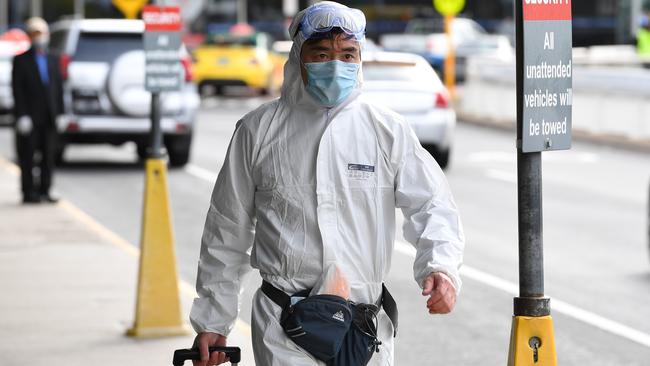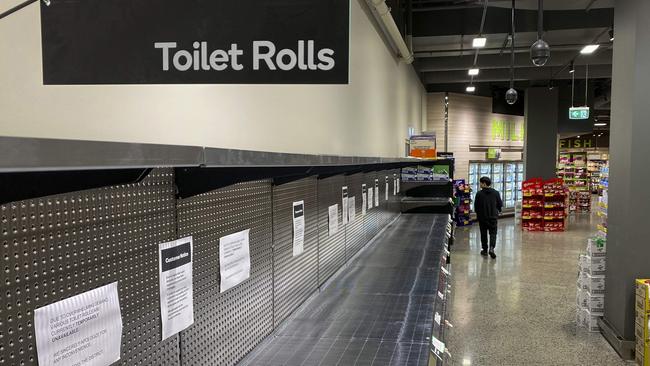Barefoot Investor: In this time of crisis, don’t flush your retirement
The past three weeks have been emotionally harrowing, especially for older people, but making investment decisions now is like being a mad shopper in Coles, hurtling down the aisle to claim the last pack of toilet paper. Panic won’t pay off in the long-run, writes the Barefoot Investor.
Barefoot Investor
Don't miss out on the headlines from Barefoot Investor. Followed categories will be added to My News.
Out here, everything is pretty calm (well, as calm as things can be with three kids under six).
That changed on Thursday night.
The corona-crisis meant I had radio interviews booked solid for Friday, so I decided to spend the night in the city.
And, since my family wasn’t with me, I thought I’d take a walk through the streets of Melbourne — at 10pm, alone.
It was a surreal experience.
I could feel that something wasn’t right … something had changed.
People hurried past me wearing face masks.
I overheard snatches of concerned conversations, left and right, talking about the coronavirus.
On my walk, I passed three supermarkets. Out of curiosity, I looked inside. Each one had been pillaged — there was no toilet paper, no tissues, no hand sanitiser.
At the Woolworths on Elizabeth St, a staff member told me, “We only got two packages of toilet paper earlier this evening, and they both sold in seconds”.
I returned to my room and went to bed just as the US share market opened — and it soon halted trading as shares went into free fall.
This hasn’t happened in decades … yet this week it has happened twice.
The next day I woke up to find that Wall Street had seen its biggest crash in 32 years.
Make no mistake: these past few weeks will go down in history. Our grandkids will look back on this period of market madness — when people were tasered for toilet paper and the markets lost a quarter of their value in three weeks.
And so this week I’m breaking my own rules and devoting my entire column to just one question.
But it’s a big one (and I’ve received hundreds just like it).

Q&A
I AM TERRIFIED
ANNE WRITES: I am in my late fifties and am terrified by the current coronavirus climate.
I have my own super fund and it’s dropped $40,000 in the last fortnight, from $370,000 to $330,000. I know what you are going to say — sit tight! — but every fibre in my being is screaming ‘sell!’
BAREFOOT REPLIES:
OK, so a few things you need to know before I answer Anne’s question.
I’ve changed her name.
And it’s a few weeks old, so her super would presumably be down much more than $40,000 by now.
Finally — and most importantly — I’m not going to be an investment jerk and just cut-and-paste some Warren Buffett quote about “focusing on the long term” (from an 89-year-old, no less).
After all, it’s one thing to point to a chart and totally next level to see $40,000 (and counting) disintegrate before your very eyes.
The fear people are feeling right now is real, and very raw.
So to Anne’s question:
You’re facing some tough decisions, so I want you to take a few deep breaths and walk through them with me.
Make no mistake, the past three weeks have been emotionally harrowing, especially for older people. The thing is, you’ve framed your question as “either/or”: either sell and stop the losses, or hang on and hope it gets better.
Yet it’s more complicated than that.
Let’s say you make your investment decisions like a mad shopper in Coles, hurtling down the aisle and hip-and-shouldering a five-year-old girl out of the way to claim that last pack of sweet-ass Sorbent.
In other words, you’re so panicked by the “global recession” headlines that you sell your super investments and move all your money to the “safety” of cash.
Job done, right?
Well, no.
Here’s what happens next:
By selling out, you’ve “locked in” your losses — at a time where the share market is down 25 per cent in three weeks.
In other words, you’ll miss out on the massive upswings that history tells us occur, eventually, after every crash.
You’ll have effectively switched the compound interest machine to “off”.
But it gets worse …
The tax man will come knocking on your already wounded portfolio.
In other words, you’ll have to pay capital gains tax (CGT) of 10 per cent if you hold your investments longer than 12 months, but 15 per cent if held for less than 12 months.
And worse still …

Your super will now be parked in cash and it’ll therefore be guaranteed to lose you money each year.
Why?
Because prices rise faster than your money earns in interest (otherwise known as “inflation”).
Think of it as the financial equivalent of standing in quicksand: each year you sink a little lower.
Here’s you: “Well, at least I won’t be watching my money go down the toilet before my eyes!”
Here’s me: “I completely understand where you’re coming from, and I’ve heard it all before.”
Specifically, back in 2009, in the depths of the global financial crisis, I had retirees writing to me saying the exact same thing.
Quite a few of them sold their shares, deciding to wait till the coast was clear before they got back into the market.
You know what?
They’re still waiting for the coast to be clear.
And here’s the thing: I can tell you after 20 years of being in the investment game that the coast is never clear.
Truth be told, the thing that makes the stock market so scary is that you can’t control it.
As we’ve seen this week, it’s driven by the same people who hoard Sorbent and rice for a 14-day cleanse.
So, Anne, let’s instead focus on some things you can control:
One, make sure you’re in a low-cost fund with the right asset allocation for your age (if you’re unsure, it’s a good idea to sit down with a fee-for-service financial adviser and check).
Second, once you’ve done that, just stop looking at your super. Granted, it sounds simple, but it works.
(It’s a bit like watching Married At First Sight — instead of getting all riled up at the antics of badly behaving bogans, just switch off the telly.)
Third, you can put your investment decisions on autopilot: you can actually take advantage of these market falls while you’re still working by automatically saving more money into your super while shares are cheaper (talk to your fund).
And finally, in the years before you’re about to retire, begin building up a cash buffer of around three years of living expenses (less any pension payments), so you can ride out any market bumps — like this one — without having to sell.
Anne, I can’t guarantee where the share market will be in a year or two. No one can. Yet what I can tell you is that the biggest risk you face is not the short-term movement of the share market — it’s having your super eaten away by inflation.
Don’t flush your retirement down the toilet!
If you have a money question, go to barefootinvestor.com and #askbarefoot
The Barefoot Investor for Families: The Only Kids’ Money Guide You’ll Ever Need (HarperCollins)RRP $29.99
The Barefoot Investor holds an Australian Financial Services Licence (302081). This is general advice only. It should not replace individual, independent, personal financial advice.
Tread Your Own Path!
Originally published as Barefoot Investor: In this time of crisis, don’t flush your retirement


